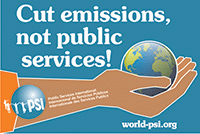Climate agreement ratified in Paris

Others call it a sell-out, where governments have bowed to pressure from the corporate fossil fuels lobby, with goals that will once again postpone the painful actions needed to move us to low or zero carbon societies.
Rosa Pavanelli, General Secretary of Public Services International, says:
“The Paris Agreement[1] is an important milestone, a victory for diplomacy after too many years of defeats. We applaud the reference to the 1.5° ceiling; the acknowledgement of common but differentiated responsibilities; the funding for both mitigation and adaptation, and the regular review processes.”
Ms Pavanelli warns that the corporate lobby will continue to pressure governments for policies that give priority to protecting their profits:
“In the first week of the COP 21, PSI released a study showing that, at the same time in Geneva, governments were secretly negotiating the energy annex of the Trade in Services Agreement (TISA) which would exactly block countries from implementing policies to keep fossil fuels in the ground. The corporate hypocrisy on climate must be revealed and resisted. Local and national governments will need new regulations, extra finance, dedicated staff, training in specific skills and other tools to move us towards zero carbon societies. Some profits will be threatened.”
The labour movement fought valiantly to have the concept of Just Transition[2] included in the binding body of the text. In the final agreement, just transition and decent work are mentioned in the nonbinding preamble.
“The road forward will not be easy,” says Ms. Pavanelli. “Governments will really need to take the lead, quickly, and at all levels: national, regional and local. The national commitments tabled so far are not enough; we need to do more, now. Workers and trade unions will have to accept their responsibilities, to be active in the workplace, both for reducing carbon emissions and to prepare for the inevitable climate extremes. We will also need to work in our communities to create the political pressure needed to counter the neoliberal assault on everything public, as we know that without public investment, no transition will be possible.”
[1] English: http://unfccc.int/resource/docs/2015/cop21/eng/l09.pdf; Spanish: http://unfccc.int/resource/docs/2015/cop21/spa/l09s.pdf
French: http://unfccc.int/resource/docs/2015/cop21/fre/l09f.pdf ; Arabic: http://unfccc.int/resource/docs/2015/cop21/ARA/l09a.pdf; Russian: http://unfccc.int/resource/docs/2015/cop21/rus/l09r.pdf ; Chinese : http://unfccc.int/resource/docs/2015/cop21/chi/l09c.pdf
[2] Just transition is an approach to environmental policy-making that aims to minimize the impact of environmental policies on workers in affected industries and communities.

